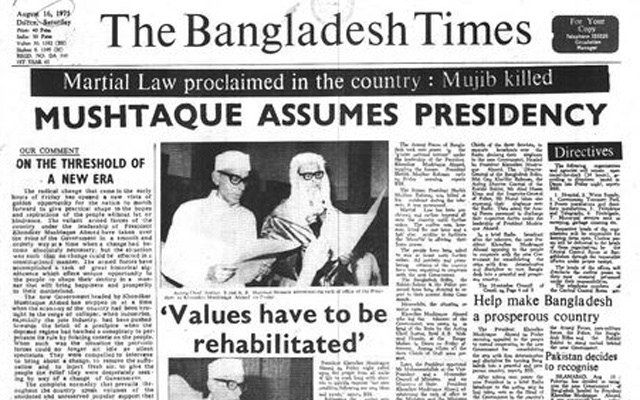1975 Assassination of Bangladesh’s founder

In the early hours of August 15, 1975 detachments of the Bangladesh Army roared through Dhaka as part of a military coup. Some were stationed to prevent possible opposition, others were bent on assassinating government figures. One unit backed by tanks attacked the presidential palace and murdered the country’s Prime Minister, Sheikh Mujibur Rahman, and members of his family. A junta of army officers was installed to rule the country.
Mujib, as he was called, had been the leading figure in obtaining his country’s independence. In 1947 the territories of British India were partitioned into a Hindu-majority India and two Muslim-dominated areas dubbed East and West Pakistan. The latter were separated by a thousand miles, and different cultures and languages. The West dominated the government and declared Urdu to be the official language despite the fact that the easterners largely spoke Bengali. Resentment against this enforced inferiority resulted in a 1971 rebellion in the east. Mujib, who had called for civil disobedience and resistance, was taken prisoner and the West Pakistani army tried to suppress the rising with enormous brutality including a campaign of rape; millions were displaced, 300,000 were said to have been killed and 200,000 women raped. The actions against women were allegedly supported by Muslim religious leaders, who declared that Bengali women were gonimoter maal (public property). This prompted Indian intervention and the result was a nasty war, ending in the independence of the east in a new state known as Pakistan. Mujib was released and returned home in 1972 to become the country’s first president.
Though Bangladesh was now independent, unrest continued. The country was devastated by the civil war, left-wing rebels wanted to impose communism, and Muslim fundamentalists objected to Mujib’s secular approach. Corruption was endemic, and was blamed for the famine conditions in many parts of the country. Mujib attempted to centralize power in himself with a new constitution that banned all political parties but his own; his paramilitary forces committed numerous atrocities. The situation was ripe for a coup.
After Mujib’s murder, the military junta ruled for a time before it too was overthrown. Bangladesh has suffered from political instability ever since, though at the present time the government is democratic and headed by Mujib’s daughter, Sheikh Hasina.